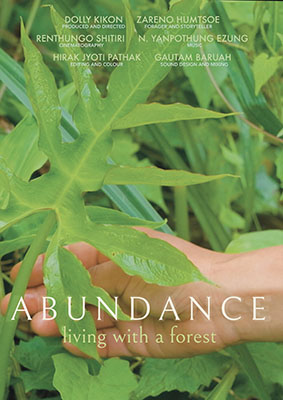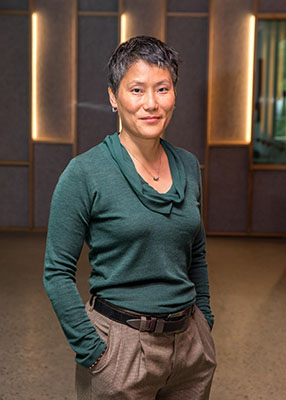Campus News
Dolly Kikon’s new film Abundance selected for South Asia Film Festival, showcasing Indigenous Worlds in Nagaland
UC Santa Cruz Anthropology Professor Dolly Kikon’s documentary highlights the ecological and cultural richness of Nagaland. The film will be screened on campus this Wednesday, November 13.


In the opening images of UC Santa Cruz Anthropology Professor Dolly Kikon’s award-winning new documentary, Abundance: Living With A Forest, insects chime in the background as foragers make their way through a lush landscape, searching for edible plants.
The scene is unhurried and contemplative, but there is an elegiac quality to the story.
The documentary presents a way of life deeply rooted in Indigenous knowledge systems and community practices in Nagaland, a small mountainous state in northeastern India.
However, this way of life faces existential threats due to modern agricultural practices like monocropping and land-use changes tied to ongoing ceasefire agreements in the region.
Kikon, born and raised in Nagaland, has long been committed to documenting the resilience of her ancestral homeland.
Known for its rich cultural heritage and diverse range of Indigenous Naga tribes, Nagaland has a population of about 2 million people who rely on traditional forms of agriculture, such as jhum cultivation, as well as foraging in the region’s forests.
Kikon’s powerful exploration of Indigenous foraging and ecological resilience in Abundance has earned the film a spot at the prestigious South Asia Film Festival in Nepal.
Chosen by an international jury alongside top films from Bhutan, Sri Lanka, and other nations, Abundance builds on Kikon’s achievements as a scholar, storyteller, and advocate for Indigenous rights.
This is her second film to receive acclaim, following Seasons of Life (2019), which screened at five film festivals.
“I feel there is a connection that the jury and the audience are able to make with my films,” Kikon explained, noting the unique relevance of her work for the festival’s Himalayan audience, who share many of the cultural and ecological concerns depicted in Abundance.
The documentary follows the life of Zareno, a Lotha forager in Khumtsü, while tracing the journey of foraged edible plants to the marketplace in Wokha.
Kikon’s connection to the film is intellectual and personal, aligning with her broader academic interests in foodways, Indigenous cultivation practices, and social justice.
Through Abundance, she advocates for a profound respect for Indigenous practices and a call for ecological stewardship, extending her research into the relationship between people, land, and decolonial resistance.
In addition to her filmmaking, Kikon is a strong advocate for her homeland. Most recently, she played a key role in halting the auction of a 19th-century human skull in England. The plan to sell the skull drew backlash from the Naga tribal community as well as international condemnation.
As a member of Return Restore and Decolonize (RRaD), a research initiative instituted by the Forum for Naga Reconciliation, Kikon has been active in initiating community dialogues on the repatriation of Naga ancestral human remains, which she sees as part of “the healing of the land,” directly connecting with her work on Indigenous ecology and decolonial practices.
While reflecting on her achievements, Kikon acknowledged the many contributions of her UC colleagues, including UC Santa Cruz Associate Professor of Anthropology Tsim Schneider, UC Berkeley Professor of Anthropology Sabrina Aggarwal, and UC Santa Barbara Professor of Religious Studies Greg Johnson, who supported her in stopping the ban on the recent auction of a Naga skull in England.
Kikon is Director of the Center for South Asian Studies (CSAS), which is housed at The Humanities Institute at UCSC. She is the author of several books, including Experiences of Naga Women in Armed Conflict: Narratives from a Militarized Society. In her work, she embodies a philosophy that blends scholarship, activism, and creative pursuits.
“My films and writings hold key principles I practice as a scholar, thinker, writer, and activist,” Kikon said. “I center care, courage, and justice as guiding frames for my life. I don’t separate my life from my writing, leadership, and who I am as a person.”
As the director of CSAS, Kikon continues a strong tradition set by the founding director Professor Anjali Arondekar. “We are committed to justice, feminism, and anti-caste politics,” Kikon said. “I am surrounded by colleagues who are deeply committed and engaged with social and political concerns around us, so this place feels like home for me.”
On Wednesday, November 13, UC Santa Cruz will host a screening of Abundance: Living with a Forest, an opportunity for viewers to experience Kikon’s perspective on foraging and forest life in Nagaland. This event, free and open to the public, will take place at Humanities Building 1, Room 210, from 12:15 to 1:30 PM. For readers interested in supporting the repatriation of Naga remains, Kikon encourages them to visit the Return, Restore, and Decolonize website.